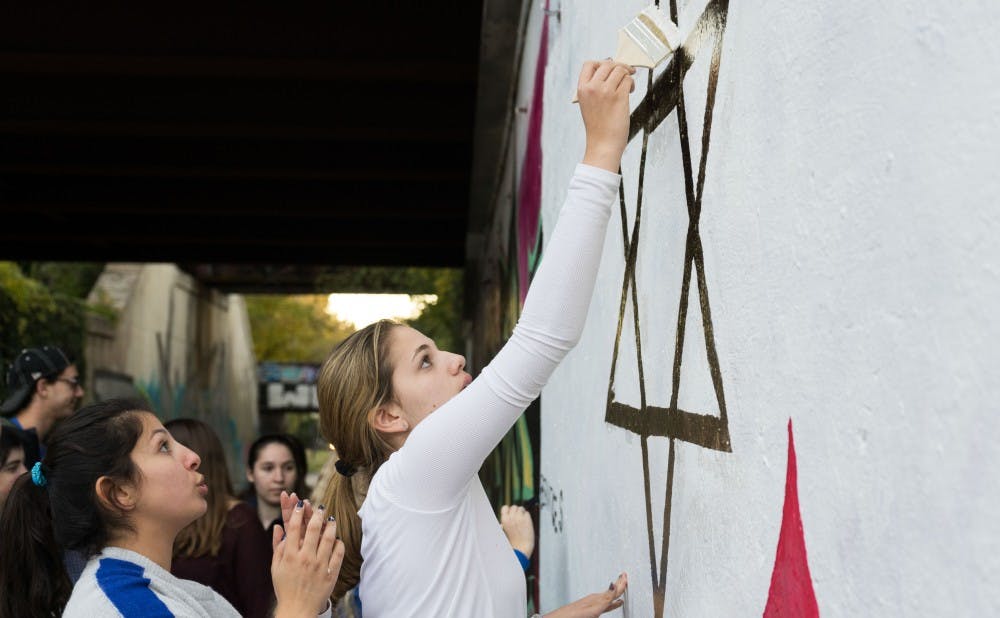Like many in the Duke and Durham community, I was deeply distressed to learn of last week’s appearances of white nationalist materials on campus. This follows the heart-wrenching vandalism from the week before, in which a swastika defaced a beautiful tribute to Pittsburgh’s synagogue victims. And like many in the community, I am both infuriated and bewildered that such grotesque acts are occurring in the place I have lived, worked and raised my family for over 15 years.
My immediate instinct was to echo prior statements that hatred of any kind has no place in our community, and that we must work together to eradicate all despicable intolerance from within. But upon reflection, I’m not sure that’s the right message. As an active member of both Duke’s and Durham’s Jewish community—my work includes a stint as president of a Durham synagogue and a term on the board at Durham’s Jewish day school—I have dedicated considerable hours to building a Jewish life for my family, children and fellow congregants. Thinking of them, and of the community, makes me reconsider the instinctive reaction.
After a Thanksgiving of reflection, I can distill my thoughts into two messages.
First, to those who are peddling in Neo-Nazi symbols: you are not succeeding. With each act of vandalism, anonymous posting, or graffitied swastika, my inbox is filled with messages of support from my non-Jewish colleagues and friends. I am certain that every Jewish student and staff person can report the same. With each effort to intimidate, you are triggering an outpouring of support for Jews at Duke and in Durham. With each attempt to make Jews feel uncomfortable here, you are reminding us that we belong.
You also should know that part of your failure is in how antithetical your effort is to the university’s mission. We value ideas, and you have not expressed any ideas. Stickers and pamphlets are not ideas. Swastikas and hanging nooses are not ideas. Defacements are certainly not ideas (and are themselves grounds for real punishment). You are welcome as members of our university community if you live by the rules that the rest of us follow: you must engage in civil discourse, articulate ideas, and support claims with reason and evidence. We do not strive for ideological uniformity—to the contrary, we embrace a diversity of ideas and would benefit from constructive dialogue between all political circles—but the university’s first principles demand a language of substance.
And to my fellow Jewish community members, especially to our undergraduates: I am honored to share this place with you. I hope you know how important you are to those of us who have made Durham our home, and I hope you also know how special this community is. I am overjoyed, as you should be, that ours is a community that created the beautiful Pittsburgh tribute at the free expression tunnel. A disgraceful defacement does not change who we are.
We should also remind ourselves of our history. One of our people’s remarkable achievements has been our ability to make a home in unfamiliar places. We have wandered the globe to make homes in distant corners, each time building community bonds while becoming patriots and cornerstones in the states where we settle. We have now made our home in Durham, N.C., and we thrive here as we’ve thrived elsewhere. That is our quiet but overwhelming response to hatred.
And Duke, at its core, is the mirror image of our story: it has prospered as it has grown from a regional to a national to an international university. Its strength has been its openness to scholars from across the world. Just as we have thrived by dispersing to unfamiliar places, Duke thrives by gathering diversity and teaching all of us about the unfamiliar.
You should know that Duke is an exceptional place for you, for us. Yes, we will speak with one voice against hateful prejudice, and we must show love and support for our Muslim, African-American, Mormon, undocumented, and other community members that have been targets of hate and intolerance. But our better weapon is the same as our primary task here. We should embrace the stimulating intellectual and cultural community that surrounds us—we should learn, study, grow and thrive—and make this the home that we want it to be.
Barak Richman is the Bartlett Professor of law and business administration.
Get The Chronicle straight to your inbox
Signup for our weekly newsletter. Cancel at any time.

